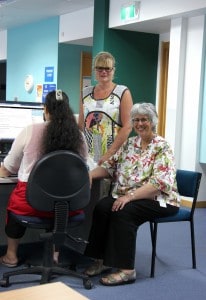 In 2011, the Bachelor of Social Science (Social Work) ‘went blended’. Precipitated by the merger of EIT’s two campuses, going blended meant that the teaching of the BASS degree, like several other EIT programmes before it, was delivered to students through a combination of face-to-face and online contact. Considerable upgrade of technologies and support infrastructure were required to ensure that the student cohorts on both campuses received the degree delivery equitably.
In 2011, the Bachelor of Social Science (Social Work) ‘went blended’. Precipitated by the merger of EIT’s two campuses, going blended meant that the teaching of the BASS degree, like several other EIT programmes before it, was delivered to students through a combination of face-to-face and online contact. Considerable upgrade of technologies and support infrastructure were required to ensure that the student cohorts on both campuses received the degree delivery equitably.
Blended learning also required the BASS lecturing staff to redesign their courses for a seamless integration of online and face-to-face delivery, to develop skills in teaching technologies and to learn new processes for cross-campus teaching. Partly to examine the demands of this curriculum change and to assess and monitor the new learning process, Judy Wivell and Stephanie Day worked together to capture the experiences of the staff and students involved in the BASS blended delivery. Their research considered the tools, skills and techniques that contributed to positive learning experiences and how these might be enhanced. They also explored the use of pedagogical principles in the development of BASS courses and appraised whether or not critical thinking could be effectively developed in a blended context.
Over a two-year period, BASS staff and students on both campuses were invited to participate in online surveys and focus group discussions. Four staff focus groups were conducted and seven student groups, each consisting of students from a single year and involving 30 students in total. Forty-two students completed the online survey.
Judy and Stephanie discovered it was sometimes difficult to sort out whether the comments being expressed by staff and student were responses to the challenges involved in merging two geographically distanced institutions or were specifically about delivering the blended BASS programme. Clearly the experiences were intertwined. However, staff highlighted the challenges of designing effective teaching and learning materials for delivering complex concepts online. They also commented on their increased awareness of the role of critical thinking in an online environment where interactive activities are needed for students’ cognitive development.
Some results of Judy and Stephanie’s research are soon to be published in the journal, Advances in Social Work and Welfare Education. Their paper presents the following themes: pedagogical shifts, changes and challenges; the significance of time and space; engagement in learning; technological practicalities; student orientation to blended learning; developing relationships. Their insights are largely congruent with the burgeoning literature about online teaching and learning.
Judy Wivell
Senior Lecturer, Applied Social Science
jwivell@eit.ac.nz
Stephanie Day
Education Advisor, Learning Technologies
sday@eit.ac.nz
